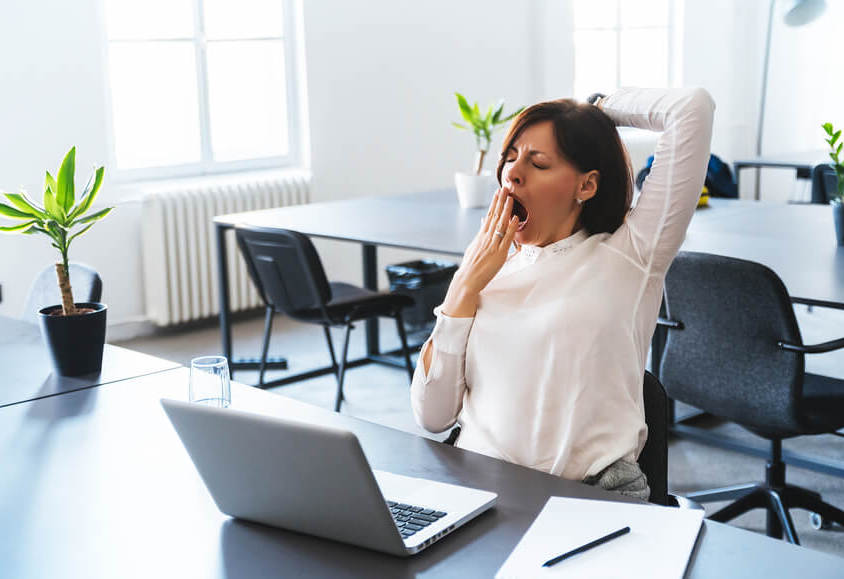
Can Exercise Improve Hypersomnia?
In this hustle and bustle of the 21st century, it almost feels like tiredness is the new normal. That is why it is sometimes difficult to even diagnose disorders such as hypersomnia. Basically, many people write it off as something temporary and something normal, since they have experienced the symptoms of hypersomnia at one point or another.
However, regardless of what modern life tells us, our body’s normal mode is not tiredness. If the feeling’s persistent and occurs frequently enough, it might be time to check whether you have hypersomnia and whether you need professional help.
Also, you might try other ways of alleviating symptoms of hypersomnia.
That is, it might be a good idea to try exercising.
What is Hypersomnia?
Hypersomnia is a disorder which manifests itself as excessive sleepiness during the day. Also, it can mean that a person is spending too much time sleeping without feeling rested afterwards. If a person is suffering from hypersomnia, they may feel sleepy even after they’ve slept, for instance, ten or even twelve hours.
Now, in general, there truly is nothing wrong with being sleepy from time to time. We have various obligations and duties that simply know how to drain a person.
However, hypersomnia is much more than that.
Hypersomnia is such a pronounced and prolonged sense of fatigue that it almost wears down on your very bones.
Since it mostly manifests itself in constant drowsiness, this disorder may prevent you from doing a number of everyday activities, such as driving, and even your job. It affects not only your energy levels, but also your concentration, making it sometimes difficult to remember even the simplest things.
Some of the possible causes of hypersomnia include:
- Sleep apnea
- Sleep deprivation
- Drug or alcohol abuse
- Prescription drugs
- Depression
- Head injury
- Excessive weight
And some other, related issues. It is important to note that, if you believe you may be suffering from hypersomnia, it necessary to see a doctor for treatment.
Hypersomnia can affect every age group, but it seems that it is more prevalent in people between 15 and 30. Sometimes it takes years for hypersomnia to develop fully, with people feeling intermittent symptoms but writing them off as temporary.
If you’ve ever felt the symptoms of hypersomnia, then you know that this is quite a serious disorder. Aside from affecting your day-to-day life, it can, subsequently, affect your mental state and cause a vicious cycle from which it can be a bit difficult to escape.
Nowadays, awareness is being spread about the disorder by organizations such as the Hypersomnia Foundation, which devotes its effort to researching and fighting the disorder in the hopes of finding a cure.
Types and Symptoms of Hypersomnia
There are two types of hypersomnia – primary and secondary. In the case of primary hypersomnia, the only symptom there is excessive tiredness. That is, the tiredness is not connected to any other condition.
However, secondary hypersomnia is linked with other medical conditions, such as those already mentioned.
Also, it is important to note that hypersomnia is different from narcolepsy. While narcolepsy causes people to fall asleep suddenly, people with hypersomnia are able to stay awake, albeit with difficulty. Namely, while they are awake, they still feel tired as though they need to sleep.
Basic symptoms of hypersomnia include, but are not limited to:
- Drowsiness
- Anxiety
- Loss of appetite
- Memory lapse
- Irritation
- General slowness and sluggishness

If the condition is left untreated, it can make everyday life quite difficult. Someone suffering from hypersomnia can even lose the ability to function normally. That is why it is important to seek help as soon as possible.
Is Exercise Effective in Treating Hypersomnia?
Aside from being good for your body, exercising is also good for your mind. It’s no wonder many people swear by exercising as a panacea. It truly can do everything.
Well, maybe not everything.
But it can certainly help with a lot of things.
There has been some research that proves the link between exercising and reducing hypersomnia. However, while there is a direct link between them, there are also various other, indirect ways in which exercise can help people suffering from hypersomnia.
After all, the benefits are truly vast.
Here are some of the most common benefits of exercising:
1) Helps with Weight Management
Exercise is definitely important in preventing obesity and helping you maintain a constant weight. However, in most cases, you’re most likely to even lose weight which has the added benefit of making you feel better about your body.
Also, by keeping your weight at a constant level, exercising reduces the risk of many weight-related health issues.
Physical activity done on a regular basis actually activates your metabolism in the best way. If you want your metabolism running like a Swiss watch, well – get to running.
Or doing any type of exercise. Your body’s not too picky, it will be happy with anything you can give. Just start and continue, one day at a time.
2) Increases Dopamine Production
Well, while it can’t provide you with total, forever-kind of happiness, what exercising can do, actually, is boost your happiness levels.
Even a small amount of exercising will improve your mood and relax you. And it does all that with the help of endorphins. Also, while you’re exercising, your brain increases its dopamine production.
It makes a difference even for shorter periods of time, let alone if you do it regularly.
You can do all sorts of exercises, like cycling, running. Doing yoga is known for making people feel more at ease and calmer.
So, grab your yoga mat and devote yourself to your body!
3) Helps with Stress Management
Like constant tiredness, it seems like we’ve accepted the fact that stress is a constant in our lives. However, that is not our normal state. Our bodies rebel, and many of its parts seem to simply enter a state of chaos because of that.
Our muscles get strained, our stomachs get upset, our head starts hurting. And that’s just the light problems.
When we’re stressed, cortisol and adrenaline can go into hyper production.
And that, you guessed it, is not good.
Which is where exercise steps in.
Exercise counteracts these hormones with its own, happy hormones. And eases your body’s stress.
Simply put, there’s no better feeling than when you sweat out the day’s stress on a regular basis. Get rid of the excess of those pesky hormones and calm your body down.
Another good thing about exercise is, when you’re physically active, you’re also raising your heart rate and subjecting your body to low-levels of… well, basically, stress.
(But, the good kind!)
And, when you do that regularly, your body will become better equipped at handling other stressors that you may face.
Another good thing is to combine exercise with other things that relax you. If you like bubble baths, essential oils, incense sticks, try them out, as well, often. Enjoying the things that you love will help you deal better with stress.

4) Beneficial for Muscles and Bones
As we get older, we inevitably lose muscle mass and most people start having bone problems. This, in turn, can lead to various types of disabilities and further stress.
And affect the quality of your sleep in quite a negative way.
Of course, it’s common knowledge that exercise, combined with appropriate protein intake, builds muscles. Also, regular exercise, even slight exercise, is vital to maintaining strength as we grow older.
Also, we bet you didn’t know that exercise can actually build bone density? This is incredibly important when you’re growing. However, it is practically invaluable in preventing osteoporosis when you grow old.
5) Improves General Immunity
Exercise is known to actually help with a number of ailments.
It even helps with the common cold.
Yes, even with the common cold.
But, exercise can also help with the following chronic diseases:
- Heart disease. Again, one of the best things you can do if you want to help your heart is to exercise. It is a well-known fact that exercise helps people with chronic heart disease. But, if you suffer from any heart-related illness, make sure to go easy. Don’t overexert yourself.
- Cancer. Aside from benefiting people who have had cancer by improving their quality of life, it can also lower the risk of some types of cancer – breast, uterine, lung and colon cancer.
- Diabetes. It has been proven that physical activity can help insulin lower the sugar level in your blood more effectively.
- Back pain. With improving muscles, regular physical activity can enhance endurance in your back, helping your chronic back pain.
- Asthma. Regular exercise lowers the severity of asthma attacks. It can also reduce their frequency.
6) Increases Energy Levels
Research has shown that even 15-20 minutes of low intensity exercise can increase energy levels, making you feel less tired.
If someone who is unaccustomed to exercise starts even a low-level program, that increases the blood flow through their body. This causes more oxygen and nutrients to be delivered to muscle tissue, which, in turn, enhances their ability to produce energy.

That is one of the reasons exercise can help the people diagnosed with primary hypersomnia.
However, as research has shown, exercise can also prove to be counterproductive in these cases. Namely, if people who previously did not exercise at all start doing moderate or high intensity workouts, this can actually further drain their energy levels since they have not developed a good base.
Remember, slow and steady wins the race.
And another thing. This can seem like a huge paradox – but exercising also helps you sleep better. That’s right! It significantly improves the quality of your sleep, making you better-rested.
Now, don’t expect results right away.
The key word here is regular. Regular physical activity is important. However, it is up to you to make your own exercise plan. You are the only one who knows best what your body can and can’t handle.
So, if your regular consists of you hiking two-three days a week, perfect!
If it includes going to the gym four times a week, excellent!
If you’re more inclined to exercise with your family, marvelous!
Remember, everything counts and it is you who sets the pace.
So, Can Exercise Improve Hypersomnia?
Researchers from UT Southwestern Medical Center’s Center for Depression Research and Clinical Care have found out that exercise can, in fact, alleviate excessive daytime sleepiness, i.e. hypersomnia in patients that suffer from depression.
They identified two biological markers for hypersomnia in the blood of the test subjects. Their research actually demonstrated that regular exercise reduces levels of these biomarker proteins, which, in turn, results in reduced hypersomnia.
Previously, researchers had found that sleep, inflammation and depression interact in “a negative loop,” which simply causes the symptoms to progressively worsen. Apparently, their research has shown, exercise can reset the negative loop.
More than 100 subjects between 18 and 70, who suffered from major depression disorder, were assigned to two types of aerobic exercise, since the researchers wanted to see the effects that exercise had on depression. The research lasted for 12 weeks. They examined their blood for four biomarkers and found that reductions in two biomarkers – BDNF and IL-1β – are connected to reductions in hypersomnia.
However, while the reductions in these two biomarkers caused reductions in hypersomnia, the research did not identify any correlation between them and changes in insomnia. That means that different mechanisms are at play in insomnia and in hypersomnia.
So, basically – yes, exercise can alleviate hypersomnia symptoms in patients suffering from depression. However, further research needs to be done in this area, as many parts of the disorder are still unknown.
That said, it does seem that exercise, as with many other things, can have a positive effect on hypersomnia.
So, it doesn’t hurt to try, right?
How much should you exercise?
Most health experts recommend at least a 20 minutes of exercise every day to maintain the well-being of your body.
It’s enough to do moderate-intensity exercise, and you’re set.
This can include brisk walks, hiking, swimming and even gardening.
But also remember that this is for people who are not that used to exercising. If you’re already a professional, you can simply slightly increase the intensity of your exercises.
You can do moderate to high level exercises such as running, aerobic dancing, even rock climbing.
Every little bit helps and every little bit is significant for the overall well-being of your body.



